GALLUP NEWS SERVICE
PRINCETON, NJ -- Depending on where Americans live, on Monday they'll be celebrating the birthday of the nation's first president, George Washington, or Washington's birthday and President Abraham Lincoln's birthday. A recent Gallup Poll asking Americans to name, without prompting, the "greatest United States president," finds Americans most often mentioning Ronald Reagan. Republicans and Democrats differ sharply in their views of the greatest president, with Republicans most often mentioning Reagan and Democrats most often mentioning Bill Clinton. When asked to choose the greater president between Lincoln and Washington, Americans pick Lincoln by a wide margin.
Reagan Tops List
The poll, conducted Feb. 7-10, finds that Reagan is mentioned more often than any other president in history as the greatest, at 20%. Four other presidents trail closely behind: Clinton (with 15% of the mentions), Lincoln (14%), Franklin D. Roosevelt (12%), and John F. Kennedy (also 12%). The current president, George W. Bush, and the first president, Washington, are each mentioned by 5% of Americans.
Whom do you regard as the greatest United States president?
|
|
Feb |
Nov |
Apr |
Feb |
Feb |
|
|
|
% |
% |
% |
% |
% |
% |
|
Ronald Reagan |
20 |
13 |
10 |
18 |
11 |
12 |
|
Bill Clinton |
15 |
9 |
11 |
9 |
5 |
12 |
|
Abraham Lincoln |
14 |
17 |
15 |
14 |
18 |
18 |
|
Franklin D. Roosevelt |
12 |
11 |
9 |
6 |
12 |
9 |
|
John F. Kennedy |
12 |
17 |
13 |
16 |
22 |
12 |
|
George W. Bush |
5 |
3 |
11 |
-- |
-- |
-- |
|
George Washington |
5 |
7 |
7 |
5 |
5 |
12 |
|
Jimmy Carter |
3 |
3 |
3 |
4 |
3 |
3 |
|
Harry S. Truman |
2 |
3 |
4 |
6 |
3 |
4 |
|
Theodore Roosevelt |
2 |
3 |
2 |
2 |
3 |
3 |
|
Thomas Jefferson |
2 |
3 |
2 |
1 |
3 |
2 |
|
George H.W. Bush |
1 |
2 |
2 |
3 |
3 |
5 |
|
Dwight Eisenhower |
1 |
2 |
1 |
1 |
3 |
2 |
|
Richard Nixon |
1 |
1 |
1 |
1 |
2 |
2 |
|
|
|
|
|
|
|
|
|
Other |
1 |
2 |
2 |
5 |
3 |
1 |
|
None |
1 |
* |
1 |
2 |
* |
1 |
|
No opinion |
3 |
4 |
6 |
7 |
4 |
2 |
|
|
|
|
|
|
|
|
|
2000-2001 questions asked of a half sample |
||||||
Since 1999, Gallup has asked this question six times, and over that period, three key points have emerged:
- Lincoln and Kennedy have typically rated at or near the top of
the list. In 1999, Lincoln topped the list with a six-percentage
point lead over Washington, Kennedy, Reagan, and Clinton. Kennedy
led the pack the next year, with a small four-percentage point lead
over Lincoln.
- Polling in 2001 and 2003 found no clear-cut victor among the
presidents mentioned.
- Reagan has the highest percentage of people mentioning him as the greatest president for the second time. The previous time was in 2001, around celebrations of his 90th birthday. After his death last year, more Americans regard him as the greatest president than did so in November 2003.
Republicans Say Reagan Is Greatest President, Democrats Say Clinton
There are substantial, albeit not necessarily surprising, differences between Republicans' and Democrats' choices for the greatest president in history.
Republicans overwhelmingly say that Reagan is the greatest president in history, with 42% mentioning him. Two other Republican presidents -- Lincoln and the current president Bush -- follow far behind Reagan, at 14% and 13%, respectively. All told, 76% of Republicans mention a Republican president as the greatest.
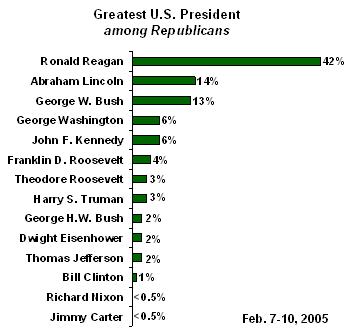
Democrats are most likely to say Clinton is the greatest president, with 31% of Democrats mentioning him. Two other Democratic presidents, Franklin D. Roosevelt (18%) and Kennedy (15%), trail Clinton. Lincoln is the only Republican president identified by a large percentage of Democrats, with 10% saying he is the greatest president. Seventy-two percent of Democrats mention a Democratic president as the greatest.
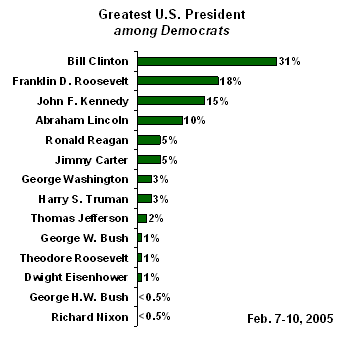
Among independents, there is no clear consensus as to which president is the greatest. Lincoln, Franklin D. Roosevelt, Kennedy, Clinton, and Reagan are mentioned most frequently.
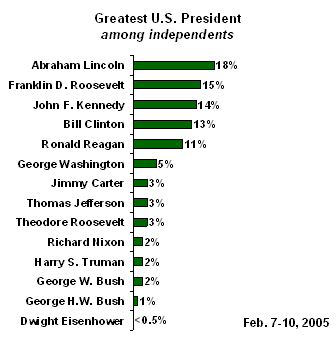
Age Affects Vote for Greatest U.S. President
There are interesting and significant differences in choice of greatest U.S. president by age, with Americans tending to select a leader from the formative years of their generation.
Clinton is the top choice among 18- to 29-year-olds, while Reagan scores highest for those aged 30 to 49, Kennedy for those aged 50 to 64, and Franklin D. Roosevelt for those aged 65 and older.
|
Greatest U.S. President by Age Group |
||||
|
|
18- to 29- |
30- to 49- |
50- to 64- |
65 years |
|
% |
% |
% |
% |
|
|
Bill Clinton |
24 |
16 |
13 |
9 |
|
Abraham Lincoln |
18 |
15 |
13 |
9 |
|
Ronald Reagan |
15 |
24 |
16 |
19 |
|
George W. Bush |
10 |
5 |
4 |
3 |
|
Franklin D. Roosevelt |
8 |
7 |
10 |
31 |
|
John F. Kennedy |
6 |
9 |
23 |
7 |
|
George Washington |
5 |
6 |
2 |
7 |
|
Theodore Roosevelt |
3 |
3 |
1 |
3 |
|
Jimmy Carter |
1 |
4 |
4 |
1 |
|
Thomas Jefferson |
1 |
3 |
1 |
1 |
|
Harry S. Truman |
1 |
* |
4 |
5 |
|
George H.W. Bush |
-- |
2 |
1 |
* |
|
Dwight Eisenhower |
-- |
1 |
2 |
2 |
|
Richard Nixon |
-- |
1 |
1 |
1 |
Lincoln Beats Washington as the Greater President
When asked to decide the greater president between Washington and Lincoln, Americans choose Lincoln, by 69% to 26%. The same was true six years ago, when Gallup last asked the question.
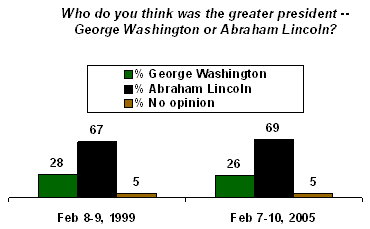
Although a majority of Americans in all demographic subgroups say Lincoln is the greater president, the data show some modest variations by party affiliation and gender. Republicans (35%) are slightly more likely than Democrats (25%) to say Washington is the greater president. Men are also slightly more inclined than women to say Washington is the greater president, by 32% to 21%.
Majority Wouldn't Want Their Child to Be President
A majority of Americans, 57%, say that if they had a young son or daughter, they would not want that child to grow up to be president someday, while 40% would.
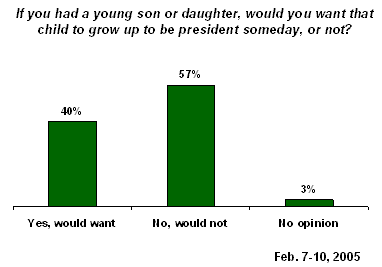
Men and women vary significantly on this measure. Fifty-two percent of men, compared with 29% of women, would want their child to grow up to be president.
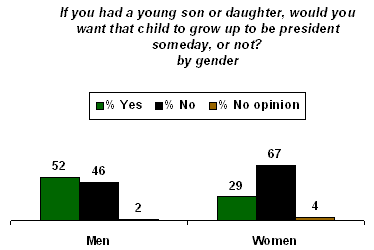
Survey Methods
These results are based on telephone interviews with a randomly selected national sample of 1,008 adults, aged 18 and older, conducted Feb. 7-10, 2005. For results based on this sample, one can say with 95% confidence that the maximum error attributable to sampling and other random effects is ±3 percentage points. In addition to sampling error, question wording and practical difficulties in conducting surveys can introduce error or bias into the findings of public opinion polls.
